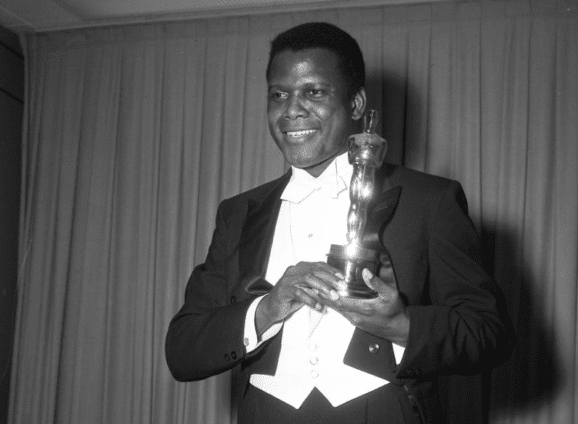Jaguar Wright says if a Sidney Poitier documentary was made; Would be the most DAMNING in Hollywood – HO

Unveiling Hollywood’s Shadows: Jaguar Wright’s Controversial Insights
Jaguar Wright, an enigmatic and outspoken artist, recently sat down for a candid and controversial interview that touched on the complex intersections of race, fame, and morality in Hollywood. Wright, known for her powerful voice and no-holds-barred commentary, didn’t shy away from making explosive claims about some of the entertainment industry’s most revered figures, including Sidney Poitier, Eartha Kitt, and Sam Cooke. Wright began by targeting Sidney Poitier, an Academy Award-winning actor celebrated for breaking racial barriers in Hollywood. However, Wright suggests a darker side to his success, alleging that Poitier made significant moral compromises to advance his career. According to Wright, Poitier’s actions extended beyond professional choices, impacting personal relationships and the broader Black community. One of the most startling claims Wright makes is that Poitier was used as an operative to keep tabs on other Black entertainers. She recounts a long-standing rumor in Black Hollywood that if Poitier showed up at your party, it was because “they were watching you.” This accusation paints Poitier not just as a trailblazer, but also as a tool of the very system he appeared to challenge. Wright further alleges that Poitier betrayed Eartha Kitt, a talented actress and singer, because of her race. Poitier, according to Wright, was in love with Kitt but refused to be seen with her publicly, believing it would hinder his career. This personal rejection, Wright argues, speaks to the systemic pressures and personal sacrifices faced by Black entertainers seeking mainstream success in a racially prejudiced society. Ruby Dee, another iconic figure in Black Hollywood, was also mentioned. Wright did not provide specific details about Poitier’s actions towards Dee, but the implication was clear: Poitier’s rise to fame involved steps that might have harmed his peers. Perhaps the most chilling part of Wright’s narrative involves the legendary singer Sam Cooke. Wright claims Cooke was murdered under suspicious circumstances that were never thoroughly investigated. She suggests that Cooke’s advocacy for Black empowerment, alongside figures like James Brown, made him a target. Cooke was allegedly warned by Poitier and others to tone down his activism, but he refused. Wright insinuates that Cooke’s death was orchestrated by powerful interests threatened by his influence. She expresses disbelief at the official story that Cooke was killed by a prostitute he allegedly tried to assault, pointing out the absurdity of such an allegation given Cooke’s immense popularity and the adoration he received from fans. Transitioning from Hollywood’s dark underbelly, Wright delves into philosophical territory, discussing the nature of money and success. She emphasizes that money is merely “energy” and what matters is how one channels that energy. Wright argues that understanding one’s true self is crucial before acquiring wealth, as money amplifies existing tendencies rather than changing one’s core character. She criticizes societal obsessions with money, illustrating her point with a metaphor about burning money—it loses all value, highlighting its intangible nature. Wright’s view is that by becoming a source of value oneself, akin to money, one ensures perpetual success and influence. Wright shares deeply personal anecdotes to underscore her points. She recounts selling her prized 1964 GTO to finance a heart transplant for her godbrother, a decision she considers the best use of her money. Despite the heartbreak of his death before the surgery, Wright values the attempt to save his life over material possessions. Conversely, Wright describes giving money to her mother, who used it to support her sister’s drug habit, as her worst financial decision. This act, though well-intentioned, ultimately caused more harm than good. These stories illustrate Wright’s belief in using wealth responsibly and the potential pitfalls of misplaced generosity. Reflecting on her family, Wright talks about her mother, who came from humble beginnings and struggled with having a famous daughter. She describes her mother’s open-heartedness and tendency to help others, even at a personal cost. Wright’s mother’s generosity often led to exploitation, a reality Wright tried but failed to shield her from. Wright’s reflections on her mother’s death reveal a complex mix of grief and relief. She believes her mother wasn’t equipped to protect herself from those seeking to exploit her relationship with her famous daughter. Wright’s sentiments underscore the emotional toll fame can take on both the celebrity and their loved ones. Wright is now focused on new ventures, including a decentralized broadcasting network on the blockchain. This platform aims to provide content creators with freedom from traditional media constraints and the potential for fairer compensation. It represents Wright’s commitment to breaking away from oppressive systems and fostering independent voices. As she celebrates her upcoming birthday, Wright remains a figure of resilience and defiance. Her insights and revelations offer a sobering look at the entertainment industry’s hidden costs and the importance of maintaining one’s integrity amidst external pressures. Through her words and actions, Jaguar Wright continues to challenge the status quo, urging others to question, reflect, and strive for authentic self-expression. VIDEO:Sidney Poitier’s Compromises

Eartha Kitt and Ruby Dee
Sam Cooke’s Untimely Death
Money as Energy
Personal Reflections and Regrets
Reflections on Fame and Family
Looking Forward





